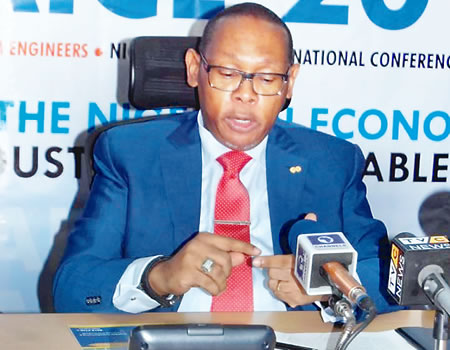
You said Nigeria can achieve 600 trillion standard cubic feet of gas (tscuf), what should be done to achieve this?
By formulating the right policy framework, 2019 should be the reset year for the oil and gas industry, where we start the growth of gas production to over 20 billion standard cubic feet per day, oil production to over four million barrels per day, reserves growth in oil to 40 billion barrels and conversion of a significant part of the estimated 600 trillion standard cubic feet of prospective gas resources to contingent resources / reserves. We expect exponential growth of refining capacity and hence less reliance on subsidies on imported products, within a decade. These are not impossible goals, but we must start now as we are running out of time.
The oil and gas sector can serve as enabler for government diversification programme, but the sector needs the right business environment for the industry to thrive and to accelerate the much-needed diversification.
Policy that enables this growth is clearly critical, but long-term stability of the business environment is also important. Policy will serve to trigger the first tranche of investments. But longer term growth in these investments will only come where Nigeria has a stable investment climate.
What is your vision on how the industry will change after the Petroleum Industry and Governance Bill (PIGB) is passed?
It is important to state that PIGB has now been returned to the Presidency for assent. It is one part of the four-pronged PIB. It is important to note that dividing the original PIB into four manageable bills by the 8th National Assembly is to be applauded and tactically allows the passage of the full PIB in four separate (but ultimately consistent) bills. The other three bills – the Petroleum Industry Administration Bill (PIAB), the Petroleum Host & Impacted Communities Development Bill (PHICB) and the Petroleum Industry Fiscal Bill (PIFB) have all been ‘publicly heard’ by the Joint National Assembly Committee on the PIB. I was at the hearing in Abuja and it became apparent that there were still fundamental differences among major stakeholders. These differences are, however, not insurmountable, but all parties must walk away from positions of ‘winning for themselves’ and find the right compromises for all to benefit from the expected growth in the industry this bill will engender.
On how the industry will change – I will touch on a few important areas and/or principles. The Single Industry Regulator, which is one of the tenets of the ‘7 MUST WINS’ is captured within the Governance Bill as the Nigerian Petroleum Regulatory Commission (NPRC), which in principle will take over the functions of the current DPR and PPRA. This a very positive change. With the right governance structure and people, should result not only in the needed transparency in regulatory activities from the upstream to downstream sectors, but also in the transparency in the reporting of rent and royalties in the Nigerian oil and gas industry. The PHICB is crafted to ensure that the Host and Impacted Communities become partners in the exploitation of resources in their locality, and is expected to bring the needed peace in these oil and gas communities to enable smooth operations of the industry. The PIFB strives to create an equitable distribution of each barrel of oil between government and investors/ operators, with a recognition of ‘terrain equity’. It also is crafted to ensure that only responsible investors/operators can derive benefit from these investments (through production allowances linked to delivering on production promises, cost efficiency and hydrocarbon reserves replacement).
How can Nigeria increase its revenues from other sources using oil and gas as enabler?
I have mentioned energy as an enabler, especially gas to power. The National Gas Policy must open the vast opportunities to deliver energy and earn significant revenue from our abundant gas resources. We are the regional giants in gas, and the entire West African (possibly Sub-Saharan Africa) region will boom if Nigeria gets it right.
With our population, a booming West African region will create huge opportunities in just about any industry. Think Indiand and China!
Nigerian companies in the renewable energy space (solar, wind, biomass and so on) will also benefit from the human capital we have developed (top class engineers), adaptable technology and the strides that have been made by our partner companies in R&D on renewables.
What factors will drive oil and gas as enabler for Nigeria government diversification programme?
Quite simple – creating the right business environment for the industry to thrive will enable the much-needed diversification. Policy that enables this growth is clearly critical, but long-term stability of the business environment is also important. Policy will serve to trigger the first tranche of investments, but longer term growth in these investments will only come where Nigeria has a stable investment climate. We must earn the respect and trust of local and international investments.
Should private sectors be the ones to lead these initiatives?
Yes, but government has a critical role to play in ensuring the right business climate.
How do IOCs and indigenous companies work together to develop the sector?
By partnering/collaborating indigenous companies are probably better positioned to influence government policies, while the IOCs have the access to investment capital, technology and the right corporate governance structures.
What are your expectations for the industry in 2019?
We expect all four aspects of the PIB to be passed by the National Assembly in 2018, assented to by the President and passed as an Act before the 2019 elections. We also expect the 7 MUST WINS to start ‘winning’.
The oil price is at a much higher level than predicted a few years back, but we must unlearn the bad practices that led to high unit technical costs when the oil price hovered at $100/bbl. The Honorable Minister of State for Petroleum Resources and the GMD NNPC are driving for unit technical costs to come to the range of $15- $18/ bbl from highs of more than $35/bbl in the past, and the industry has already come to levels of $23/bbl.
Combined with the right policy framework, 2019 should be the reset year for the oil and gas industry, where we start the growth of gas production to over 20 billion standard cubic feet per day, oil production to over four million barrels per day, reserves growth in oil to more than 40 billion barrels and conversion of a significant part of the estimated 600 trillion standard cubic feet of prospective gas resources to contingent resources /reserves, exponential growth of refining capacity (and hence less reliance on subsidies on imported products), within a decade. These are not impossible goals, but we must start now, as we are running out of time.
What is SPE Nigeria’s role in developing and shaping oil and gas policy framework?
The SPE is a non-profit and apolitical professional organisation, regulated by international best practices through the SPE International (established in 1957). We are therefore in a unique position to provide unbiased advice to the authorities for the better good of Nigeria, without the accusation of working in our own, or anyone else’s, personal interest. In addition, we provide an international perspective, through both our relationship with SPE International and, especially, through a lot of our members who have many decades of experience working internationally. Of recent, many policy areas the Nigerian Government have undertaken, e.g. the ‘7 Must Wins’ (which is embedded within, the National Oil and Gas policies) and the Petroleum Industry Bill, are supported either indirectly by SPE NC or directly through our members who consult for both the National Assembly and the Federal Executive.
This international perspective is perfectly balanced with our local knowledge and provides a powerful tool to influence and support government policy for the benefit of all stakeholders.
The SPE Nigeria will continue to play a strong role in policy formulation and execution through ensuring that the outcomes of its engagements are well documented and presented to the authorities, and continuing to encourage its members to provide the expertise in their fields to government, either through consultancy or service.
What is the importance for professional associations like SPE for the current Nigerian government and the country’s diversification?
Reliable, available and sufficient energy is critical for the diversification of the Nigerian economy, whether in the manufacturing space, in agriculture, transportation, health services, education, aviation. The SPE must continue to support the needed delivery of gas to power and gas-based industry, to enable the needed diversification and growth of the Nigerian economy. We are in a unique position to help (in collaboration with sister organisations) we have the technology, we have talented human capital grown from the grassroots, we understand and deliver structured processes for creating value, we have the expertise to derive maximum benefits from the full value chain of hydrocarbon resource exploitation and, finally, we are local with a global perspective of current and future trends. We truly believe that without professional organisations such as ours to help shape and implement policy, government will struggle to reap the full benefits from these God given resources.
WATCH TOP VIDEOS FROM NIGERIAN TRIBUNE TV
- Relationship Hangout: Public vs Private Proposals – Which Truly Wins in Love?
- “No” Is a Complete Sentence: Why You Should Stop Feeling Guilty
- Relationship Hangout: Friendship Talk 2025 – How to Be a Good Friend & Big Questions on Friendship
- Police Overpower Armed Robbers in Ibadan After Fierce Struggle





